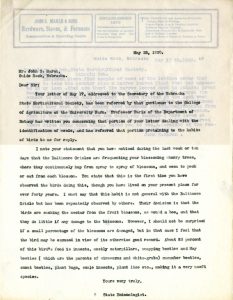Great Nebraska
Naturalists and ScientistsNOU, State Entomologist, Letter, 1920, May 25
 371-00048
371-00048
May 28, 1920.
Mr. John S. Marsh, Guide Rock, Nebraska.
Dear Sir: Your letter of May 17, addressed to the Secretary of the Nebraska State Horticultural Society, has been referred by that gentleman to the College of Agriculture at the University Farm. Professor Faris of the Department of Botany has written you concerning that portion of your letter dealing with the identification of weeds, and has referred that portion pretaining to the habits of birds to me for reply. I note your statement that you have noticed during the last week or ten days that the Baltimore Orioles are frequenting your blossoming cherry trees, where they continuously hop from spray to spray of blossoms, and seem to peck or eat from each blossom. You state that this is the first time you have observed the birds doing this though you have lived on your present place for over forty years. I must say that this habit is not general with the Baltimore Oriole but has been repeatedly observed by others. Their decision is that the birds are sucking the nectar from the fruit blossoms, as would a bee, and that they do little if any damage to the blossoms. However, I should not be surprised if a small percentage of the blossoms are damaged, but in that case I feel that the bird may be excused in view of its otherwise good record. About 83 percent of this bird’s food is insects, mostly caterpillars, snapping beetles and May beetles ( which are the parents of wireworms and white-grubs) cucumber beetles, snout beetles, plant bugs, scale insects, plant lice etc., making it a very useful species. Yours very truly, State Entomologist.